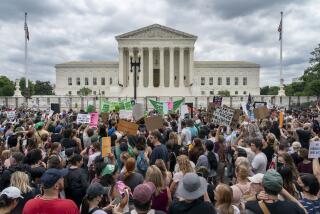Taking the Pulse of Our Youth : MICHELE ROLAND : The most pressing health problem this doctor sees is violence. She says it is time to invest in our teen-agers.
I grew up in Riverside, on a ranch. I was initially interested in animal science, but I had a sister who was chronically ill, had a lot of seizures, and I constantly went with her to the doctor. She eventually died when I was in college. That’s when I really decided to become a doctor.
Kids can come to the school clinic whenever they want, for whatever they need. Every parent has to sign a consent form, so that eliminates people saying, “Oh, we don’t want the clinic here because of this service or that service.”
Surprisingly, less than 1% or 2% of parents object to their kids asking for birth control services. People tend to think of a teen clinic as a family planning service, but we do so much more than that.
The most pressing health issue I see is the problem of violence, and people getting along. We don’t learn that in medical school, but that’s something people better do something about quickly.
Casual attitudes about violence, about date rape, people not dealing (with) and expressing anger, not really focusing on communication. It’s a multitude of problems. Traditional outlets are drying up. People don’t feel comfortable going to the park anymore; there are no more after-school programs.
Counseling is another issue. There are so many kids having family problems, it’s scary. Suicidal feelings and depression are really common. A lot of illnesses are stress-related. Many students here are new to this country and suddenly have to stay with a grandparent or someone who’s never been their parent.
At the same time they’re dealing with the usual conflicts surrounding adolescence: identity, independence. We get a lot of post-traumatic stress disorder, where students have a lot of psychosomatic complaints like headaches, stomachaches, lack of sleep due to things that have happened in the past or right now.
We see dietary problems. A lot of kids are overweight, and fitness is poor. We get kids that have a lot of bad ideas about eating right and taking diet pills. One nice thing about this clinic is that we have health educators that go into the classroom and do presentations on nutrition and 17 other topics. That’s very important; kids don’t just come here, we go to them.
There are a lot of pregnancy scares, questions about sexually transmitted diseases, but usually after the fact. Teen-agers don’t see themselves at risk. They don’t take precautions, don’t think about AIDS. We try to make them see they really have choices, and have to exercise them. A lot of teen-agers have myths about things passed on to them from their parents--one girl told me her mother said birth control pills cause cancer. There’s a lot of misinformation out there.
Girls come in a lot for treatment of psychosomatic symptoms. I think that’s because they seek help easier. When you really talk to guys, you find they have concerns about the same issues, but they just don’t deal with them the same way. A lot of kids who come are insured through their parents, but they come here anyway because it feels relaxed and accessible.
One thing adolescents should realize is that it’s OK to go to the doctor. If you’re having emotional problems, go see a counselor. Because of cultural difficulties in addressing certain types of problems, this clinic is sort of an entryway into discussing things going on in the home--sex, drugs, suicide, education. Kids may not want to see a counselor, but we need to leave the door open, so they can have someone to talk to. Sometimes things just don’t get better. Often we see a teen-ager’s solution--substance abuse, alcohol--as a problem, when we should look deeper.
We have to look at things of value. We have to have incentives to invest in what’s happening in the city because we’re all affected. We especially have to invest in our young people, and that means their education and their health.






